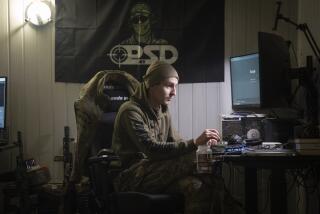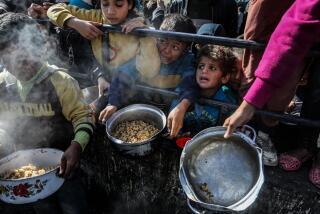With Rumor of War Came Anxiety, Pills and Chemical Suits : Military: Army troops and reporters don gas masks and hunker down after first reports of allied air raids.
- Share via
WITH U.S. FORCES, SAUDI ARABIA — The first hint of war came at midnight, when the order was passed by senior officers: An MOP-1 chemical alert was in effect.
Anxious soldiers and their visitors in darkened tents pulled on the heavy jackets and trousers of charcoal-lined protective suits. For the first time since the Persian Gulf crisis began, they took a pill designed to moderate the effects of a nerve-gas attack. Not yet required to don masks, gloves and boots, they lined them up within easy reach.
And then, while rumors rose and fell about whether this was really the beginning, there was nothing to do but wait.
Then, at 3 a.m., came the air horns, three loud blasts in the night, over and over again to jolt this Army VII Corps camp awake.
“Gas, gas, gas!” the soldiers on guard shouted in terrifying refrain as the sleepers were jolted awake and jumped from their cots to scramble for their gear.
For a reporter lulled to sleep by the effect of the medication, it was difficult to tell whether the call was “Gas, gas, gas!” or “Mask, mask, mask!” But it didn’t matter. The surge of adrenaline was just the same, and I grabbed my mask and fitted it to my face.
Certain that an Iraqi missile would explode before I could get a seal around my face, I felt as if I were moving in clumsy slow motion. But when I finished, I found that others still lagged behind. I later found that, in my panic, I had pulled my straps too tight.
Outside, the horn continued its urgent blasts. But inside, the sound of modern war was the sound of heavy breathing as soldiers, bug-like in their masks, gasped for air at double time and protective valves clicked reassuringly, first open and then shut.
To the light of a dim lantern and some red-filtered flashlight bulbs, we continued our preparations, now fitting clumsy galosh-like boots over our own heavy shoes. Finally came the rubber gloves, heavy with impregnated charcoal, to complete what--we hoped, and had been assured--was a chemical-proof seal to provide shelter from any mustard-gas, nerve or biological agent Iraq might choose to launch.
We yanked helmets over protective hoods and headed for a bunker where sandbags, we had been assured, could shield us if Iraq attacked by air. As we left the tent, an Army captain intercepted each of us at the door, checking straps and buckles like a paratroop jump-master to make sure we hadn’t left a possibly fatal gap.
Underground, we found a nightmare: the assigned bunker already crammed with soldiers from the tent next door and no place else to go. But someone realized the space was filled not just with bodies but with extra rucksacks, loaded with food and water, and an Army captain ordered that all baggage be passed back out.
This action provided room, but just barely. And just after 3:15, 19 soldiers and their visitors squeezed shoulder to shoulder in silence, packed into the gloomy chamber, a cell four feet tall, walled with sandbags and illuminated by a single lantern.
A reassuring voice urged us all to breathe slow and deep, to purge our bodies of adrenaline.
Suddenly, a jet fighter screeched overhead in a pass so low that some soldiers ducked in reflex and the deafening roar came and went in an instant. In a nearby tactical operations center, senior officers hit the deck as the fighter screeched past, and chemical-suited officers lay on the floor, hoping the jet was friendly.
Down in the bunker, soldiers noted with a sudden burst of confidence that the plane was flying from south to north--surely a sign that, if nothing else, the fighter was on our side.
More nerve-wracking, none of us could be sure what was really going on. Was this a false alarm? An Iraqi preemptive move? Or had President Bush really launched his long-threatened attack? With no radio, and no other information, we simply sat and waited.
There were efforts to break the nervous silence. “You may wonder why I’ve called you all here this morning,” said Maj. David Cook, the deputy public affairs officer for the corps who was the senior officer in the group.
“This is not my idea of a good time,” said another voice in the darkness, and all of us fervently agreed.
My head was already aching from gas-mask straps pulled overtight, forcing eyeglass inserts painfully against my forehead while rubber grasped my chin. My face would itch, and there was nothing to be done except to hope the feeling went away. It had only been 45 minutes, and there was no telling how long the alert might last.
“Remember when they told you don’t overtighten your mask?” moaned an equally uncomfortable Army captain, saying aloud what I had only thought in silence.
I crossed my fingers and hoped this alert might prove a short one so that next time I could put my mask on right.
More silence, and then another voice, giving up the attempts at humor. “It might be a good time to pray.”
Then at 4 a.m., as some began to settle down to sleep, an all-clear siren sounded dimly in the distance. A soldier was dispatched to investigate and came back with welcome news: The alert was over, and the masks could come off at last. Yanking mine off, I found it dripping with perspiration and felt the marks it had left behind on my face.
Almost limp with relief, we went inside and, while soldiers were posted to the perimeter, we were told it might be best to sleep. No one knew what had happened, and the informal consensus was that we would have been kept underground for hours had the war really begun. No one thought to check the radio.
Then, as we stripped off the masks and gloves and boots and climbed back upon our cots, Maj. Cook returned with news from the operations center.
“Gentlemen,” he said, “we are now at war with Iraq. Our planes have been hitting Baghdad for the last half an hour, and there are reports of MIGs (Soviet-made warplanes) headed this way.” A full blackout was in effect, he said; only red flashlights were permitted.
We grabbed for shortwave radios and listened in shock as the President began to address the nation.
An hour later, the horn began to sound again, and we pulled on gloves, boots and masks and headed for the bunker.
The adrenaline surged again, but this time it almost seemed old-hat.
When we emerged an hour and a half later, soldiers from the unit still stood at positions along the perimeter, where they had remained on guard in full chemical protection.
The sun had dawned to gray and stormy skies. A column of armored vehicles rumbled in the distance, and the watching soldiers sought to come to grips with he fact that the United States was now at war.
“I hope too many guys didn’t get killed today--on our side anyway,” said Sgt. John R. Strait, a 28-year-old intelligence officer from Houston.
“Today’s an opportunity to excel,” Sgt. Maj. Clifford Lovejoy told the group.
“Let’s have fun.”
More to Read
Sign up for Essential California
The most important California stories and recommendations in your inbox every morning.
You may occasionally receive promotional content from the Los Angeles Times.










